The Growth and Evolution of Telemedicine
Virtual medicine and health care have become more commonplace than ever, and the First Coast region is on board.

Remember the first time you used your phone to communicate with a friend or loved one face-to-face? That ability to feel more connected through a live video conversation has spilled over into several types of businesses and industries. The medical field is leveraging this technology through telemedicine, and it can be a major benefit to both patients and physicians.
Telemedicine (virtual care) is defined by the American Academy of Family Physicians as the practice of medicine using technology to deliver care at a distance. A physician in one location uses a telecommunications infrastructure to deliver care to a patient at a distant site. Telehealth is another term that interchanges with telemedicine
The growth and evolution of telemedicine in the First Coast region has been significant, as Florida embraced the concept in mid-2019 by passing Chapter 2019-137, Laws of Florida. The regulation established standards of practice for telehealth services, including patient evaluations, record-keeping and prescription management. Health care providers are allowed to provide telehealth services to patients using remote communication technologies and commonly used applications, including FaceTime, Facebook Messenger, Google Hangouts, Zoom or Skype.
St. Augustine-based Flagler Health+ is one of many medical facilities invested in virtual care. Through an exclusive partnership with Publix, Flagler Health offers walk-in care locations that allow patients to access virtual care by board-certified doctors for issues such as colds, allergies, sinus problems and earaches.

“Through a series of on-screen prompts, patients are connected with a doctor by video and have access to a variety of digital tools, such as thermometers, pulse and blood pressure monitors, dermascopes and other devices, which are connected to the monitor,” says Gina Mangus, VP of strategy and business development with Flagler Health. “The results go to the doctor in real-time.”
Mangus says the facility also offers an application called “Flagler Health+ Anywhere,” which allows virtual visits in physician offices.
Since 2015, Baptist Health has been utilizing telehealth to enable acute care providers to bring their expertise into community-based Emergency Departments in northeast Florida as well as southeast Georgia.
“Telehealth/virtual care has been an emerging trend throughout the health care industry, as consumers, particularly younger consumers, were becoming more comfortable using the technology for their medical needs,” says Laura Gaver, integrated communications director with Jacksonville-based Baptist Health. “It was also a solution for providing medical care to underserved or rural communities.”
The COVID-19 Effect
The COVID-19 pandemic converted the use of telehealth from convenience to necessity for maintaining physical and mental health for many patients.
“In March and April of 2020, Baptist Health and our medical groups quickly stood up telehealth visits at nearly 100 physician practices to safely continue caring for patients via virtual doctor visits,” says Gaver. “More than a year after COVID-19 started to impact our community, Baptist continues to offer virtual visits at most physician offices, including Baptist Behavioral Health, where providers are still seeing a high percentage of patients via telehealth visits, currently above 80%.”
“With a virtual visit, doctors can quickly diagnose and treat a medical issue,” she continues. “Should further evaluation be needed via an in-person visit, it could happen more rapidly, particularly if a specialist is required. The patient can be referred to the right specialist for further evaluation.”
Gaver says Telescope Health is a standout offering from Baptist Health. Their physicians live and work in the Jacksonville community, so they can provide a level of personal care, even when the visit is virtual. She adds that providers have been cooperative in providing care to patients via telehealth, viewing it as another avenue for bringing their expertise and care to the community.
The Future of Telemedicine
To be sure, the onset of COVID-19 expedited the world of telehealth, telemedicine and virtual care. Medical facilities and patients alike are embracing the benefits of these services and can be confident in the quality of healthcare provided and received.
“The telehealth trend will continue to grow,” says Gaver. “People want to see a doctor on their terms, when they need one, in a way that is most convenient to them. HealthPlace On Demand allows them to see a doctor wherever they are at the time. It also helps ensure patients won’t delay care.”
Mangus says Flagler Health is leveraging the latest in technology to simplify the healthcare experience for everyone and to help patients get the care they need, the support they want and the inspiration to achieve better health.
“Through added features such as moderated online communities, remote patient monitoring and integrated digital tools, we are engaging with patients in new ways to achieve optimum health,” she says.
As for Baptist Health, the facility plans to be a part of this continued evolution: “The telehealth/virtual visit field is growing, and we at Baptist Health look forward to leading the way.”









